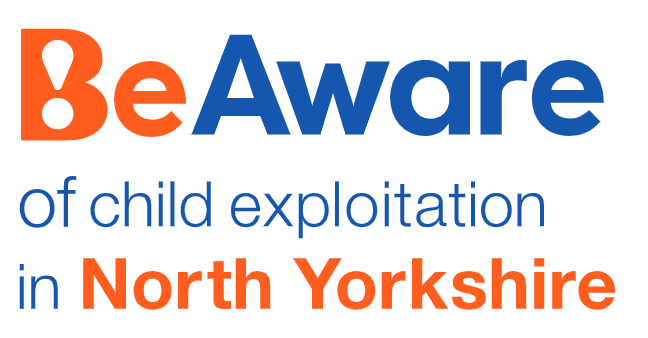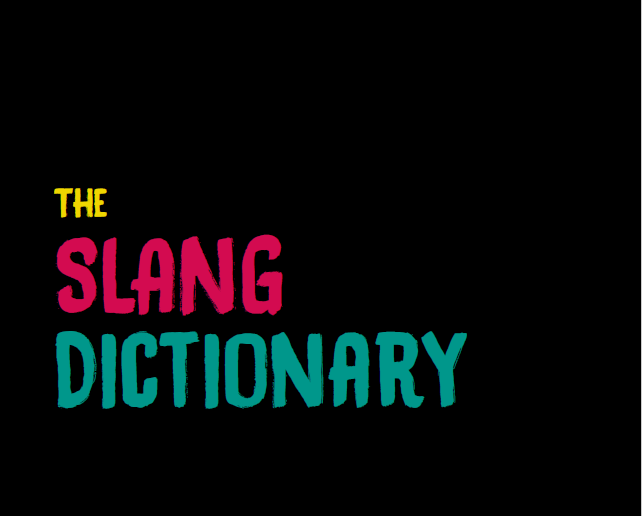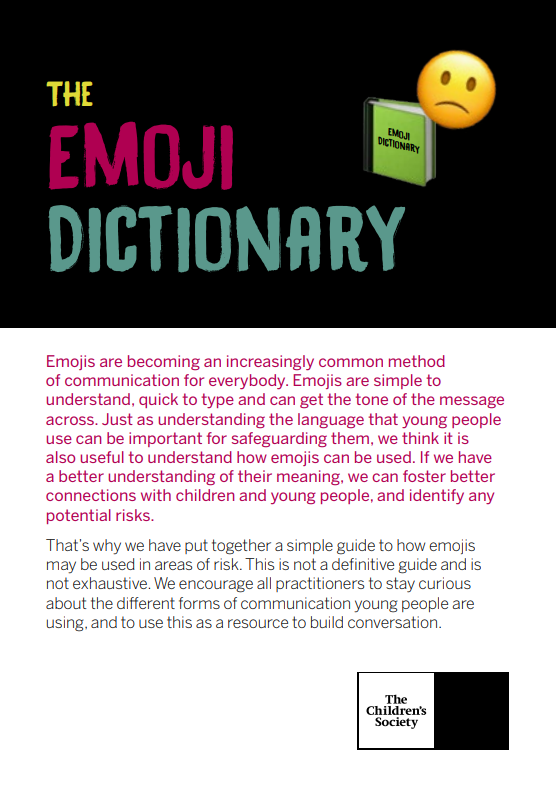
Be Aware: Jargon Buster
This section of Be Aware aims to provide a clear overview of some of the language and terminology used when talking about child exploitation.
This can either be terminology and jargon used by professionals, or slang words/phrases used by young people when talking about activities that may involve exploitation, or be a sign that exploitation may be happening.
The Children’s Society has produced The Slang Dictionary – which seeks to support parents, carers, and professionals to better understand the language young people may be using and support them in safeguarding young people. They have also produced the Emoji Dictionary: Just as understanding the language that young people use can be important for safeguarding them, we think it is also useful to understand how emojis can be used. If we have a better understanding of their meaning, we can foster better connections with children and young people, and identify any potential risks
The Children’s Society Resources:
Jargon A-Z
| What it means: | Find out more: | |
| ASB | A form of domestic abuse, It describes a pattern of behaviours a perpetrator uses to gain control and power by subjecting a partner to controlling, threatening or humiliating behaviour. | |
| Bando /Trap House | A building used as a base from where drugs are sold (or sometimes manufactured). These houses usually are occupied by someone (usually adult drug users but sometimes young people are forced to stay in trap houses). | |
| Bribery | To try to make someone do something for you by giving them money or gifts. | |
| Catfishing | Catfishing is when someone uses false images and information to create a new identity online. | Catfishing (cybersmile.org) |
| CCE | Child Criminal Exploitation | NYSCP (safeguardingchildren.co.uk) |
| Clean Skin | Young people with a ‘clean; criminal record. Can be targeted by perpetrators as they are not known to police. | |
| Coercive Control | ‘County lines’ is the term used to describe the approach taken by gangs originating from large urban areas, who travel to locations elsewhere such as county or coastal towns to sell class-A drugs. Gangs typically recruit and exploit children and vulnerable young people to courier drugs and cash. Typically, users ask for drugs via a mobile phone line used by the gang. Gangs can recruit children from their own area – often ‘clean skins’ who are less likely to look out of place. | Coercive Control – Where is the line? – YouTube |
| Contextual Safeguarding | It’s an approach to understanding, and responding to, young people’s experiences of significant harm beyond their families. It recognises that the different relationships that young people form in their neighbourhoods, schools, and online can feature violence and abuse. | NYSCP (safeguardingchildren.co.uk) What is contextual safeguarding? – YouTube |
| County Lines | This usually involves identifying vulnerable people. The dealers then coerce and sometimes threaten the vulnerable person into allowing them to take control of their home so they can use it to store and sell drugs. | NCLCC – County Lines Awareness Video – YouTube |
| CSE | Child Sexual Exploitation | NYSCP (safeguardingchildren.co.uk) |
| Cuckooing | When a child or young person believes they are in debt to the perpetrators. They may believe have to work for free to pay off the debt. This can also apply if the child or young person is robbed, or if they are arrested and have drugs, money, or the phone confiscated by police. | What is Cuckooing? – YouTube NYSCP (safeguardingchildren.co.uk) |
| Debt Bondage | Is the action or fact of treating someone unfairly to benefit from their work. Examples might include forced or grooming behaviour so that you are committing criminal or sexual activity | |
| Deets | Account details – perpetrators can target young people to open bank accounts for them for the purposes of financial exploitation. | |
| Domestic servitude | A form of trafficking. It is a type of forced labour whereby the victim is usually expected to work day and night for little or no pay. | Domestic Servitude Animation – West Yorkshire Combined Authority (westyorks-ca.gov.uk) |
| Elders | Older members of a gang, with more responsibility over operations, money, drugs & weapons. | |
| Exploitation | Is the action or fact of treating someone unfairly in order to benefit from their work. Examples might include forced or grooming behaviour so that you are committing criminal or sexual activity | |
| Financial Exploitation | Also see: County Lines This is the most popular term that describes county line activity. It can also mean the act of travelling to another city/town to deliver drugs or money. | |
| Gang | A gang can be a group of friends that all like doing the same things. Some gangs are involved in crime. Sometimes gangs are violent and might fight other gangs or carry weapons. | CSE June poster-5 (catch-22.org.uk) What’s a Gang? – YouTube |
| ‘going country’ /going cunch | Grooming is when someone builds a relationship, trust, and emotional connection with a child or young person so they can manipulate, exploit and abuse them. | |
| Grooming | See: Trafficking, Modern Slavery Trafficking is another word for modern-day slavery and is the name given to people who are bought and sold into exploitation. It is the selling and buying of people for profit. Human trafficking can happen to anyone; men, women or children. There also many different types of trafficking some of which are: organ harvesting, forced labour and domestic servitude. | Stages of Child Criminal Exploitation – YouTube |
| Human Trafficking | Independent Child Trafficking Guardians – offers advice, guidance, and support for children (aged under 18) who have been exploited through trafficking and Modern Slavery. We also provide support, advice and guidance for professionals working with young people who are victims of trafficking and Modern Slavery. | NYSCP (safeguardingchildren.co.uk) |
| ICTGs | Missing from Home and Care Anyone whose whereabouts cannot be established will be considered missing until located and their well-being or otherwise confirmed. All reports of missing people sit within a continuum of risk from ‘no apparent risk (absent)’ through to high-risk cases that require immediate, intensive action. | https://barnardos.pagetiger.com/ictg-a-guide-for-professionals/v1 |
| MFHC | This refers to human trafficking, slavery, servitude and forced or compulsory labour for the purpose of exploitation. Therefore, any child who is recruited, transported, transferred, harboured or received for the purposes of exploitation is considered to be a victim of modern slavery. | NYSCP (safeguardingchildren.co.uk) |
| Modern Slavery | We often think of child abuse and exploitation as young people being abused by adults. However, it’s growing increasingly common for young people to be abused and exploited by other people in their age group (or only a little bit older) – this is known as ‘peer on peer’ or ‘child on child’ abuse. | NYSCP |
| Money Mule (also known as Squaring) | A person who transfers stolen money on behalf of others, usually through their bank account. Criminals contact people and offer them cash to receive money into their bank account and transfer it to another account. NB: Please note that the preferred term is to say that a child has been financially exploited. | What is a money mule? – Money Mules |
| NRM | National Referral Mechanism – When a child has been moved for the purposes of exploitation, a National Referral Mechanism (NRM) should be completed for the child. This referral will give the police and supporting agencies greater powers to disrupt their abusers and more access to support for the victims. | NRM leaflet – 2 (pagetiger.com) NYSCP (safeguardingchildren.co.uk) |
| Peer on Peer abuse/child-on-child abuse | When a young person is forced or coerced to internally carry drugs to avoid detection. Inserting items for transport (ie drugs/money) into the body, usually into the rectum or vagina | |
| Plugging | Sexting is when someone sends or receives a sexually explicit text, image, or video. This includes sending ‘nude pics’, ‘rude pics’, or ‘nude selfies’. | |
| Revenge Porn | when you share private sexual photos or videos, of another person, without their consent to upset them. | Sexting & Revenge Porn – YouTube |
| Sexting | When someone uses sexual images/videos that you have produced of yourself to bribe you for money by threatening to share these images/videos with your friends of family or publishing them online. | Sexting and sending nudes | Childline Sexting & Revenge Porn – YouTube |
| Sextortion/Sexually Coerced extortion | Trafficking occurs when children and young people are tricked, forced, or persuaded to leave their homes and are moved or transported and then exploited, forced to work or sold. Child trafficking takes place for a variety of reasons including sexual exploitation, benefit fraud, forced marriage, domestic slavery, forced labour in factories, working on cannabis farms or moving drugs. | Help if you’re worried about ‘sextortion’ or online blackmail (iwf.org.uk) |
| Smurfing | Linked to child financial exploitation – using specialist software to arrange lots of small bank deposits that are not usually flagged. | |
| Squaring | Money laundering. | |
| Trafficking see Modern Slavery, Human Trafficking | Trafficking occurs when children and young people are tricked, forced, or persuaded to leave their homes and are moved or transported and then exploited, forced to work, or sold. Child trafficking takes place for a variety of reasons including sexual exploitation, benefit fraud, forced marriage, domestic slavery, forced labour in factories, working on cannabis farms, or moving drugs. | |
| Trap House | A place where people go to buy/sell drugs. | |
| Trapping | The act of selling drugs. Trapping can refer to the act of moving drugs from one town to another or the act of selling drugs in one. |
Page reviewed: January 2025






 View all our news
View all our news